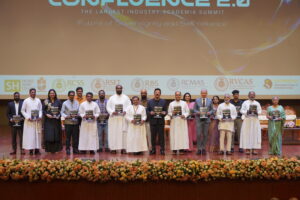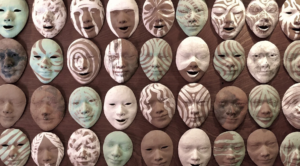PC: Arundhati Nair
Being a human being in the 21st century is a paradox. Humankind is at the best it’s been and yet, we have never felt worse. The world seems like it’s on fire and everyone is at each other’s throats. Tensions are high and patience is low, connections are high, but tolerance is low.
This has been a gut punch for humanity because life has only gotten more convenient. Healthcare is at its best, technology is accelerating, and everyone’s connected to one another at a level previously unfathomable. Every bit of information is at your fingertips, formal education is just that—a formality, anyone’s a call away and most, a text away and yet the world is spiraling out of control. You might recognize that all too familiar feeling of impending doom. Like nothing’s right and we’re all heading for disaster.
Isn’t it baffling how even with so much development, we have never felt less at ease?
To understand what’s happening, let us unpack this from the very beginning and look back to the days of yore when everything seemed alright. When we didn’t have all the world’s information at our fingertips and were limited to what little news we got served up each morning by whichever newspaper your family’s been historically subscribed to. Juicier news was provided by your friendly neighborhood tattletale or lunchtime gossip. Back when you could peacefully enjoy some not-so pleasant news in bite-sized packages over your morning coffee.
It absolutely wasn’t ideal, it was in fact lacking in many ways, and yet it was peaceful. You didn’t have to listen to what everyone who’s someone had to think about the recent amendment. You were served concise and summarized accounts of what’s happening in the world, and you were mostly free to form your own thoughts about it without having to weigh in everyone else’s opinions.
But now every five seconds you have to see what @chronicallyonlineperson thinks about global warming or how their goldfishes are suffering from someone’s opinion. Instead of being limited to ten pages of world news, you now have an endless feed of trauma and politics masked by memes and jokes. We were originally designed to handle, at most, information about the community we live in but now we’re being force-fed information about everything happening around the world 24/7. Being subject to such an endless barrage of distressing news can take a toll on your mental health, and all this is aided heavily by the most common pastime of the decade, doomscrolling.
Doomscrolling is that all too familiar situation where you start watching reels or memes because you’re bored and have nothing to do, and before you know it, it’s past bedtime, your throat is parched, your eyes are red and you’re behind on everything you had to do. You forget to take care of yourself and anyone dependent on you. You wave goodbye to your social life and mental health.
When you start scrolling through your endless feed, you’re embarking on a Russian Roulette of content consumption. This isn’t metaphorical, it is quite literally Russian Roulette. You either shoot yourself with unfathomable toxicity, or you don’t, determined solely by the algorithm so precisely tuned to keep your attention and drive-up engagement, consequently making the platform money. You go down a labyrinth of videos, all tailored to spark controversy, sound intriguing and drive engagement. Touching bits and pieces of everything, yet not quite understanding anything. It is society’s biggest and most dangerous form of entertainment.
Doomscrolling creates an instant gratification cycle of “just one more”, not far off from what gamblers experience—keeping you on your toes hoping the next reel gives you that sweet hit of dopamine, carefully giving you a dose big enough to satiate you, but small enough to keep you wanting more—like the half wins at casino slot machines. And over time, just like smoking and other vices, you start needing more and more to get that same sense of euphoria. This is why you see most social platforms move onto short form content; it makes the most money.
Speaking of money making, haven’t you noticed how short form content is surprisingly lacking when it comes to advertising? On a YouTube video for example, you can only start watching your videos after sitting through three un-skippable ads or after skipping through two. Yet when you move to shorts on the same platform, suddenly you can watch five shorts without any ads and when an advert does pop up, you can swipe right through?
This sounds counter-intuitive, how does short content make more money with less ads? This brings us to the next issue when it comes to short form content—privacy.
This isn’t the “stealing your photos” or “leaking your bank account credentials” infringement. It’s a more notorious, hidden and ignored form of privacy infringement. It infringes on the privacy of your mind.
When you scroll through your infinite feed liking some videos, and swiping right through others, you’re teaching an artificial intelligence in the background exactly what you like and what you dislike. Every minute you spend on the platform is more and more data used to tune the algorithm to your habits, preferences, political opinions, likes, and dislikes. And this same data is then thrown back at you to keep you on the platform.
This is why when you start a social media account, the first few weeks your feed is bogus and uninteresting, but then it slowly becomes exactly how you like it.
It would’ve been less problematic if this data stayed within the platform to tune your preferences, but this same data is then sold to advertisers to show you exactly the type of products you would buy and what services you would want. There’s an algorithm in the background that knows you better than you know yourself, working against you. It sounds like something out of a dystopian science-fiction novel but it’s happening right before your eyes. Not to say there aren’t more obvious forms of privacy breaches, like when you talk to your friends about your favorite shoes and the next time you scroll, your feed is filled with shoe advertisements.
This just goes to show how free content is always too good to be true. If you’re paying for a product, you get the product. If it’s free, you are the product.
Returning to our initial point on the depreciation of mental health though, the biggest issue with this type of content—apart from the narcotic-esque addiction—is the fact that it is immensely detrimental to your mind how you’re fed extremely distressing news like war, bloodshed, trauma and disasters, and then comedy, satire, propaganda, music, art and education all in the span of a few minutes. You’re refusing your brain time to process any of this information, and you enter a state of emotional fatigue, apathy and derealization. This leads to a person becoming less and less sensitive and emotionally stable. This instability is directly visible through the reducing tolerance, patience and increasing tensions of the world.
We have become so impatient and intolerant that we feel more comfortable in our feeds than with other human beings. This is evident in the fact that messaging services now feel the need to include a speed up option in voice notes, because somehow, we’re too impatient to keep up with the speed of a talking person. We cannot focus on a conversation or an event without there being twenty-five cuts and sound effects, and a Subway Surfers gameplay below it.
Here I am pretending to be all high and mighty writing about the negative effects of doomscrolling, when I’ve taken 15 breaks while writing this to scroll through reels.
The point is, we’re at the tipping point of humanity. We’re inching towards a dystopian world where humans cannot be trusted to interact with one another without an AI to regulate and filter, where every opinion is either black or white and every conversation is an argument. Where attack happens before understanding and where death-threats precede introspection.
The truth, though, is that humanity is far beyond what you see in reels. The world might seem frightening and tragic from a 6.3-inch window. But real life isn’t so black and white. Everyone’s always loud on a keyboard when the real world is a lot more peaceful. It’s overwhelming but I promise you, it won’t be that bad if we would all just go out and touch some grass. The world isn’t going downhill—it’s always been a rollercoaster. We just finally got a window seat.






